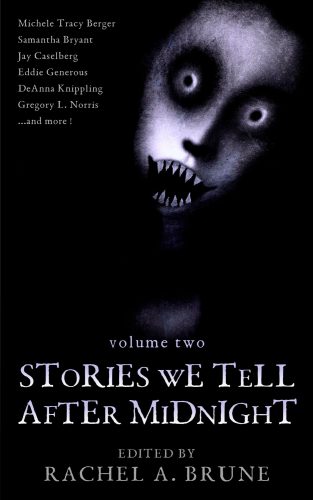
The great thing about reading horror stories, Eliza Master says, is that they allow us to explore our darkest impulses without actually having to do anything horrible.
“I’ve talked to some friends,” the Eugene writer says in a phone interview, “and like when we’re watching scary movies or something, you know, sometimes people will say something like, ‘I can’t watch it. I am not a violent person!’”
But actually being violent is not the point, Master says. “I find it very interesting to be able to delve into exploring those ideas without actually hurting anybody. It’s just kind of fascinating to be able to write whatever you want.”
One of Master’s stories, a 1,000-word short titled “Lamina,” is included in a horror anthology just out this fall. Stories We Tell After Midnight, Volume 2, is published by Crone Girls Press.
“Lamina” is a distinctly horrible tale. Without divulging any spoilers, it’s a tight, compelling story, built on an unusual narrative structure, and it deals with such contemporary issues as online dating and the dubious benefits of widespread genetic testing.
Master says horror writing can even explore politics. “When people ask me what I write, I give them the answer that I write social science fiction and fantasy, which is not a long way from political stuff. I mean, it’s not specifically political, but a lot of my writing addresses political issues. And I think even [“Lamina”] addresses how hard it is to be female. I mean, it wasn’t really her fault. I think that’s pretty much true with all the systemic racism and sexism and other problems that, you know, we have in our country. It’s something that I often address in my work.”
And horror isn’t just political, she says; it can be downright cosmic. “In addition to the obvious issues of violence and fear, I think horror as a genre deals with cosmic issues of religion and faith and so on, in a way that makes it more palatable for people who don’t think of themselves as religious.”
Master isn’t exclusively a horror writer. “I’m sort of a genre leaper,” she says. “I write in all kinds of genres, from literary to science fiction, fantasy, horror and romance. And also humor. As well as political satire. So just all over the place.”
She was born and raised in Philadelphia, came to Eugene to attend the University of Oregon and ended up having a couple of kids, who are now 26 and 29. Besides writing, she owns Potters’ Quarter in Oakway Center, a paint-your-own-pottery shop.
“I started mostly as a visual artist, but I even as a kid was writing as well, and I became a potter and opened up my shop and still continue to write. And now I am mostly just writing,” she says.
Asked about writers who have influenced her view of horror, Master names a classic — but no contemporaries.
“When I was a kid, actually, I was obsessed with Edgar Allen Poe. Right? And I mean, I just, it was like, there was a body under the stairs! I mean, you know, that kind of thing. But in terms of modern horror, like contemporary horror writers, I can’t really call up one right now.” ν
You can read “Lamina” online at EugeneWeekly.com. Stories We Tell After Midnight, Volume 2, is available at bookstores and from major online retailers.